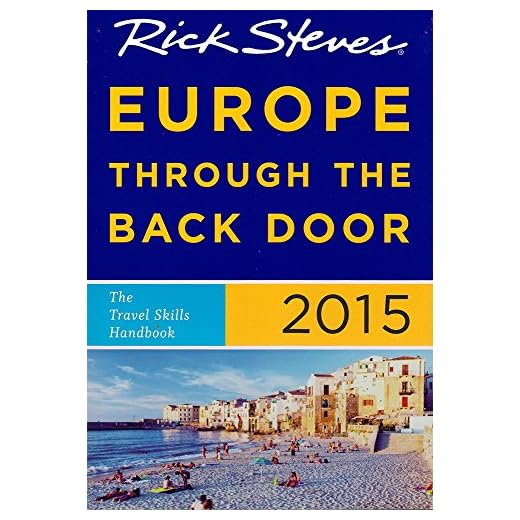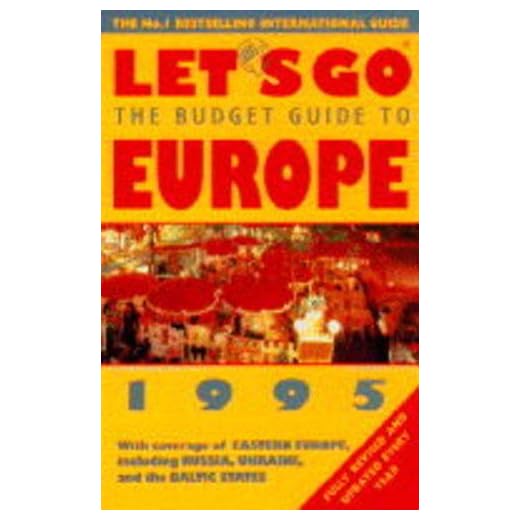



Recommendation: budget for €40–€120 per day depending on country selection and travel choices – aim for €50/day in Central and Eastern destinations, €90–€120/day in major Western capitals. For a strict two-week plan, expect roughly €700 in cheaper regions, €1,300–€1,700 for a Western-capital itinerary.
Accommodation split: dorm beds typically cost €8–€35/night outside big capitals and €25–€60/night in core Western cities; private rooms range €40–€150/night. Use hostels for social stays and kitchens to cut food costs; night buses or sleeper trains replace one night of lodging at a fare of €15–€50. Book popular routes 2–6 weeks ahead to catch discounted rail and plane fares.
Food and daily spending: supermarket meals and cooking can keep food under €7–€12/day; one inexpensive restaurant meal averages €6–€18 in cheaper countries and €12–€30 in pricier cities. Local transit day passes range €3–€10; museum entries and paid attractions add €5–€25 each. Allocate a footwear for incidental costs: €8–€25/day beyond accommodation and transit for moderate sightseeing.
Transport tactics: book long-distance buses (FlixBus and equivalents) for €5–€40 intercity; budget airlines often list base fares €10–€60 but add luggage and seat fees. Regional rail can jump in price – reserve high-speed tickets early (€20–€80) or choose slower regional trains. Consider rail passes only if multiple long high-speed hops are certain; single-pass fares may be cheaper.
Practical items: buy monthly or multi-day transit cards in large cities, use supermarket chains (Lidl, Aldi, local equivalents) for groceries, carry a reusable bottle, travel insurance for 1 month usually costs €30–€100, and Schengen visa fee (where applicable) is about €80. Recommended apps: Hostelworld, Booking.com, Omio, Skyscanner, and the major coach operator apps. Travel in April–May or September–October for lower prices and fewer crowds; avoid peak July–August for the lowest rates.
Daily budgets, sample trip totals and concrete money-saving moves for continental hostel travel
Plan on €40–90 per day for shoestring-to-budget travel in lower-cost countries; €70–150+ per day in major Western cities; expect €160–300 daily in Nordic capitals. For a 14-night trip: Eastern/central route ~€560–1,260; mixed Western route ~€980–2,100; Scandinavia-focused ~€2,240–4,200.
Accommodation & meals – exact price ranges
Hostel dorm bed: €8–30/night (Eastern), €18–50/night (Western); private hostel room or budget hotel: €40–90/night (regional average), €90–180/night (capital cities). Grocery supermarket dinner: €2.50–8; cheap street/market meal: €4–12; casual sit-down meal: €10–35; mid-range restaurant per person: €25–60. Allocate 40–60% of your total daily budget to lodging and food combined if you prefer private rooms or restaurant meals more often.
Transport, tickets and smart booking
Long-distance bus (FlixBus-style): €5–45 single; book early for €5–15 on many routes. Low-cost flights between countries: €15–80 one-way on discount carriers when booked weeks ahead. Night train couchette/sleeper: €30–150 depending on length and comfort. Regional train fares: short hops €5–35; consider a 4–10 day rail pass if you plan many long runs – passes often cost €200–500 depending on route and age. Reserve major attraction tickets online 7–14 days ahead to save time and avoid higher walk-up prices (museums €5–25, major monuments €15–35).
To reduce costs: travel nights, use buses for short-to-medium hops, buy groceries for several dinners, and choose one or two paid attractions per city while prioritizing free walking tours and public parks.
Gear recommendations: carry a compact, durable umbrella to avoid paying for replacements during rainy stretches – see a practical selection at best geeky umbrellas. For luggage, decide between a hard-shell cabin case and a soft, expandable carry-on; brand comparisons and suggestions are collected here: best luggage tumi vs samsonite.
Daily cost estimates by country and travel style: cheap, midrange, full-service
Target per-day budgets (EUR): cheap €20–60, midrange €50–160, full-service €120–400 – plan higher for Switzerland, Norway, Iceland and London.
| Country | Cheap (per day) | Midrange (per day) | Full-service (per day) | Key tip |
|---|---|---|---|---|
| Portugal | €20–40 | €50–100 | €120–220 | Eat from markets, use regional buses, book hostels early in Lisbon/Porto. |
| Spain | €25–45 | €60–110 | €140–260 | Tapas + set menus cut food costs; long-distance night buses save nights. |
| Greece | €25–45 | €55–95 | €120–200 | Mainland cheaper than islands; ferries raise the bill quickly. |
| Italy | €30–55 | €70–130 | €160–280 | Small towns much cheaper than Rome/Milan; aperitivo reduces dinner costs. |
| France | €35–60 | €80–150 | €170–320 | Choose boulangerie lunches and non-central hotels to lower spend. |
| Germany | €30–55 | €80–140 | €160–280 | Regional trains + supermarket meals reduce transport and food costs. |
| Netherlands | €35–60 | €85–150 | €180–320 | Bike rentals and day passes save on local transport in Amsterdam. |
| Czech Republic | €20–40 | €45–80 | €100–160 | Prague center pricier; beer + street food keep food costs low. |
| Poland | €20–35 | €40–70 | €80–130 | Intercity buses are cheap; choose local restaurants for value. |
| Hungary | €20–35 | €40–70 | €90–140 | Thermal baths are an affordable highlight; avoid tourist traps in central Budapest. |
| Switzerland | €70–120 | €140–260 | €300–600 | Buy a Swiss Travel Pass or self-cater; accommodation drives costs most. |
| Norway | €60–110 | €130–250 | €300–550 | Self-catering and camping cut expenses; ferries and attractions are costly. |
| United Kingdom | €40–80 | €100–200 | €220–420 | Advance train tickets and pubs’ meal deals lower daily spend; London adds a premium. |
| Iceland | €60–120 | €140–300 | €350–700 | Car hire and fuel dominate costs; camping and self-catering recommended for lower budgets. |
Cheap-style practical moves: book dorm beds or budget guesthouses, cook 1–2 meals daily, prefer overnight buses/trains, use regional transport cards; expect 15–30% seasonal spikes in tourist hotspots.
Midrange optimization: mix private rooms with occasional upgrades, reserve trains/fast ferries in advance, use lunch set menus and targeted paid attractions; allocate ~30–40% of budget to accommodation.
Full-service planning: choose centrally located hotels or boutique stays, budget for dining out twice daily, include guided tours and intercity flights/ferries; add a contingency of 10–20% for peak-season price surges.
Transport costs and practical savings: buses, regional trains, low-cost flights and passes
Quick recommendation: choose buses or regional trains for sub‑400 km hops, compare low‑cost airlines for trips over ~600 km if total door‑to‑door cost (including transfers and luggage) stays under €50, and buy a rail pass only when planned rail spend without a pass would exceed the pass price (typical break‑even: 6+ long-distance high-speed trips in one month).
Buses
- Typical fares: €5–€35 for most routes (short routes €5–15, medium 200–500 km €10–30, long overnight routes €20–40).
- When to pick a coach: overnight rides save one night’s accommodation (hostel private dorm €15–40), point‑to‑point price under €25 and total travel time acceptable.
- Book window: many low prices appear 1–3 weeks before departure; last‑minute promos sometimes available but less reliable.
- Companies: large networks (e.g., FlixBus and regional private coaches) – check luggage policy (usually one carry‑on + one checked bag; extra bags €5–€20).
- Practical saving: combine a cheap daytime regional train into a major bus hub to access sub‑€10 coach legs.
Regional trains and national low‑cost fares
- Cost per 100 km: roughly €6–20 depending on country and service class; local/regional services are cheapest and rarely require reservations.
- Use when: flexible schedules, city‑center arrivals, luggage included and for medium distances (100–400 km) where door‑to‑door time is competitive with flying.
- High‑speed trains: dynamic pricing – early booking (2–8 weeks) often yields fares from €15–40; last‑minute or peak fares €50–120+.
- Day/region passes: many countries sell regional day passes from about €20–50 allowing unlimited regional travel in a state or region – great for multi‑stop days and groups (price per person drops when split among travelers).
- Reservation notes: regional trains usually no reservation; high‑speed and international services sometimes require seat reservations (€3–€30 extra even with a pass).
Low‑cost flights and when they make sense
- Typical base fares: €10–€80 if booked early; common carriers include low‑cost operators serving intra‑continental routes. Add luggage €10–€50 and seat selection €3–20.
- Break‑even rule: prefer flight when total cost (fare + airport transfer + checked baggage) < train/coach alternative or saves 6+ hours of travel time.
- Booking strategy: best fares often 3–8 weeks ahead; use flexible date search and nearby airports; avoid extra fees by carrying only a small bag and checking exact cabin dimensions.
- Hidden costs: factor in arrival airport distance – low‑cost flights often use secondary airports with higher transfer costs (€10–€30 one way).
- Combination moves: cheap plan – short regional train to a major airport city, then a low‑cost flight for the long leg; or cheap flight into a hub then regional trains for intra‑country travel.
Rail passes: when to buy and practical caveats
- Pass types: single‑country multi‑day passes and multi‑country/global passes (pricing varies by duration and age group).
- Price ranges: single‑country passes often range €50–€250; multi‑country/global passes commonly €200–€700 depending on days and class – compare to sum of point‑to‑point fares.
- Simple rule: buy a pass if planned point‑to‑point rail fares would exceed the pass price. Example: if a global pass costs €350 and individual high‑speed tickets average €60, having 6+ such trips makes the pass worthwhile.
- Extra costs: seat reservations and supplements are not always included (expect €5–€35 per high‑speed reservation); factor these into the pass decision.
- Alternatives: regional day tickets, group splits and national discount cards can beat a pass for concentrated travel in a single country.
Practical checklist before booking:
- Estimate door‑to‑door time and total cost (fare + transfers + luggage) for flight vs train vs coach.
- Search coach networks, rail operator sites and low‑cost carriers separately – aggregator sites (Omio, Trainline, Skyscanner) speed comparison but verify final fees on operator sites.
- Factor in overnight buses to save accommodation costs and early‑book high‑speed tickets where possible to capture the cheapest fare bands.
- If considering a rail pass, add likely reservation fees to the pass price and run a quick sum of planned point‑to‑point fares to confirm break‑even.
Accommodation pricing and timing: hostels, private rooms, Airbnb and when to book
Book major-city summer dates 6–12 weeks ahead; shoulder-season months (Apr–May, Sep–Oct) 3–6 weeks; low-season 3–10 days. For festivals and big events (Oktoberfest, Euro finals, Christmas markets) reserve 3–6 months ahead and expect rates to be 50–200% above normal.
Standard nightly ranges by city type (approximate, per person for hostels / per room for private stays): Western/Northern capitals (London, Paris, Oslo, Copenhagen, Stockholm) – dorm bed €25–45, budget private €70–160, entire Airbnb €90–220. Major Southern/Eastern cities (Lisbon, Barcelona, Prague, Budapest, Kraków) – dorm bed €10–25, private €30–75, entire Airbnb €40–110. University towns and secondary destinations – dorm €8–18, private €25–55, Airbnb €30–70. Midrange hotel rooms across capitals typically €80–200+/night in high season.
Lead times vary by product: dorm beds can be booked 3 days–6 weeks ahead depending on season; small hostels fill faster for weekend nights. Budget private rooms and guesthouses: 2–8 weeks normally, up to 3 months in summer. Airbnbs show the greatest variance – book 4–12 weeks ahead in high-demand cities; for stays >28 nights check for monthly discounts (commonly 20–50%).
Price mechanics to watch: weekend (Fri–Sat) rates often 10–40% higher than midweek in tourist hubs; minimum-night rules on Airbnb commonly 2–4 nights during peak; cleaning fees €15–60 per booking and service fees 8–15% can push nightly cost up by 10–30%. Cancellation terms matter: hostels usually offer free cancellation until 24–48 hours prior, many private apartments and Airbnbs use strict policies that forfeit most of the payment if canceled late.
Savings tactics with concrete numbers: joining Hostelling International or a hostel chain can save 5–15% on bookings; choosing mixed dorms instead of female-only can drop cost by 10–25%; shifting stays to Monday–Thursday reduces average nightly rate by ~15% in many cities. Last-minute apps and direct hostel walk-ins can yield 10–30% discounts in low-season, but in summer that is high-risk.
Hidden extras and operational rules: tourist taxes commonly €0.5–8/night depending on city; refundable key deposits €10–50; late check-in fees €5–20; extra-guest charges €10–30/night. Confirm kitchen access, minimum-stay rules and check-in window before booking; check host policies on food containers and microwaves where relevant – see are tesco freezer bags microwavable.









